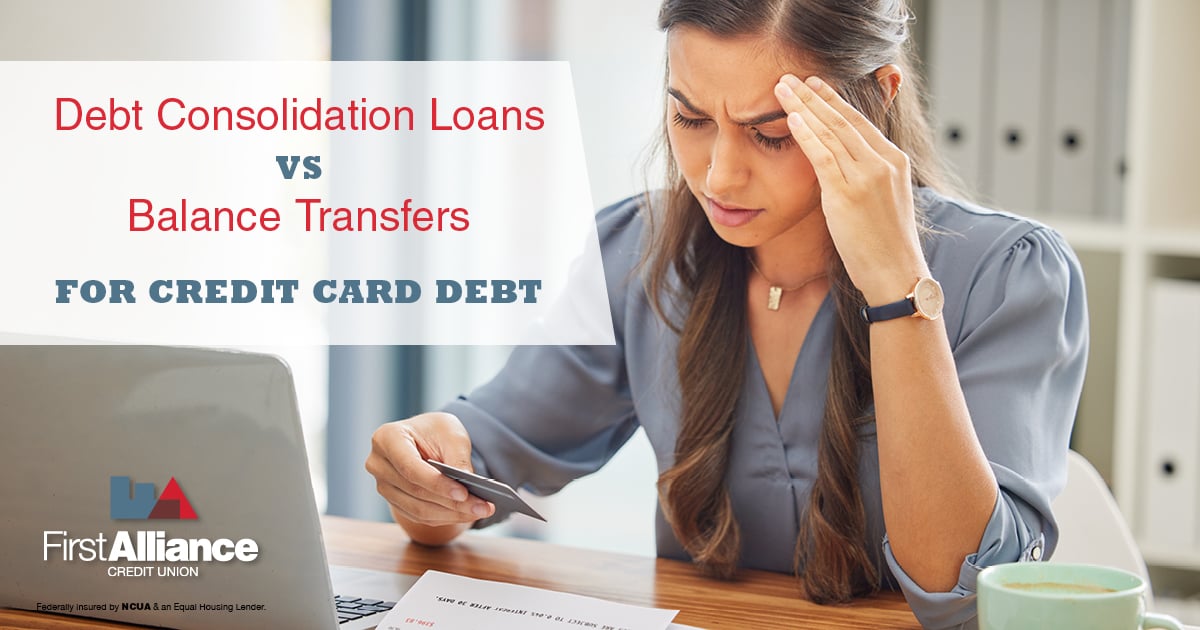Interview with a Lender: What is Debt Consolidation?
If you are struggling to pay all of your debt on time every month, then a debt consolidation loan might be a great option for you to gain some...
4 min read
 Jenna Taubel
:
Aug 7, 2018 7:42:00 AM
Jenna Taubel
:
Aug 7, 2018 7:42:00 AM

When you are struggling with large amounts of debts owed to multiple creditors, it’s understandable to want to ease the burdens and simplify your finances. There are a variety of debt management options out there and it’s important to understand your choices. Two very common solutions people consider when dealing with out of control debt are debt forgiveness plans or a debt consolidation loan. Here we review what debt forgiveness is and what a debt consolidation loan is, and then discuss their advantages and disadvantages.
 A debt forgiveness plan, also referred to as debt settlement, is when your creditors agree to cancel some, or all, of your debts owed. This form of debt management can be used with as few as one creditor or multiple, so long as you owe at least $10,000. Additionally, debt forgiveness is typically only an option for those who are at least six months or more behind on unsecured debt payments, like credit cards.
A debt forgiveness plan, also referred to as debt settlement, is when your creditors agree to cancel some, or all, of your debts owed. This form of debt management can be used with as few as one creditor or multiple, so long as you owe at least $10,000. Additionally, debt forgiveness is typically only an option for those who are at least six months or more behind on unsecured debt payments, like credit cards.
Debt forgiveness is not the same thing as a debt management plan, but they do function in similar ways. A debt forgiveness plan is commonly completed through the help of a well-established credit counseling agency or debt settlement company for a fee, but can be completed on your own. The agency works with your creditors and negotiates on your behalf to lower the total amount of debt you owe. Then you make payments to the agency and they disburse the funds to your creditors on your behalf. Depending on the lenders you owe money to and how much you owe, this process can take up to three years to fully resolve. During the debt settlement process you are typically advised to stop making payments on your debts, as this adds pressure on your creditors to negotiate with the debt settlement agency. However, doing so will further negatively impact your credit score by up to 150 points.
The main advantage of debt forgiveness is that you ultimately pay less money than you owe, so you feel like you are saving money. This is really enticing when you’re struggling to pay off large amounts of debt. However, the list of disadvantages of debt forgiveness is very long and should be taken seriously:
 The reality of the situation is that the cons of debt forgiveness far outweigh the potential savings. However, if your credit score is already below the 550 mark and you somehow have the money to pay off the newly negotiated balance as a lump sum, then debt forgiveness could be a reasonable solution to your debt problems. If you don’t fit this scenario, don’t be discouraged from getting your debt under control. There are a plethora of other debt management solutions to consider with fewer disadvantages than debt forgiveness, including debt management programs or debt consolidation.
The reality of the situation is that the cons of debt forgiveness far outweigh the potential savings. However, if your credit score is already below the 550 mark and you somehow have the money to pay off the newly negotiated balance as a lump sum, then debt forgiveness could be a reasonable solution to your debt problems. If you don’t fit this scenario, don’t be discouraged from getting your debt under control. There are a plethora of other debt management solutions to consider with fewer disadvantages than debt forgiveness, including debt management programs or debt consolidation.
A debt consolidation loan is a form of debt refinancing that uses a new loan to pay off all of your existing debts. You will then make one monthly payment to the new loan until it is paid off. There are several types of loans you can use for debt consolidation including: signature loans, home equity loans, and credit card balance transfers. Debt consolidation loans are typically able to be completed within a day or two at most banks and credit unions. Debt consolidation loans offer terms between three to five years and at lower interest rates than most other unsecured debts. You can consolidate several different kinds of debts with a debt consolidation loan including medical debts, credit card debt, back taxes, personal loans, and even secured debts such as vehicle loans.
Debt consolidation loans should have one of two outcomes to be a viable debt management solution for you. First, the monthly payment on the debt consolidation loan should be lower than the total combined payments you were making before. Or, the debt consolidation loan should allow you to pay off your debt faster than if you continued to pay them off separately. These two outcomes are achieved by lowering the interest rates you’re paying and placing a fixed term on to your debt, which would have otherwise been revolving debt, such as with credit cards. You should consider yourself a very good candidate for debt consolidation if you would be able to both lower your total monthly obligations and have a faster time to pay off.
Debt consolidation has several benefits for someone looking to gain control over their financial situation, especially when compared to debt forgiveness:
Debt consolidation does have some disadvantages as well, but they are not as severe as debt forgiveness. After debt consolidation, just like with any debt management solution, you will need to improve your spending and savings habits to keep yourself from falling into the same position. Also, in some situations the lender you get your debt consolidation loan from may require you to close some of your credit cards, which could decrease your credit score slightly. It will be important to speak with the financial institution to understand exactly the impact a debt consolidation loan will have on your credit score.
The advantages of debt consolidation far overshadow those of debt forgiveness. While debt consolidation may not be the perfect option for everyone, it really all depends on your specific financial situation; debt forgiveness is rarely an appropriate solution to your debt issues.
Debt forgiveness, can seem like a great option in theory, but in practice it is often full of more struggles long term. The debt forgiveness industry is also wrought with scams and is poorly regulated, especially for people seeking credit card debt forgiveness.
Debt consolidation on the other hand, is a common type of loan that is relatively easy to obtain from reliable financial institutions. Regardless of how you intend to manage your debt, it will greatly benefit you to meet with a trustworthy financial institution to review your options. They will be able to pull your credit report and review your full financial picture with you, then give you your best options based on your specific financial situation.

If you are struggling to pay all of your debt on time every month, then a debt consolidation loan might be a great option for you to gain some...

When it comes to managing your debt there are a lot of repayment strategies to consider when your debt becomes overwhelming. Two very common options...

Whether you’re drowning in credit card debt or just looking to streamline your payments, there are countless options to choose from when it comes to...